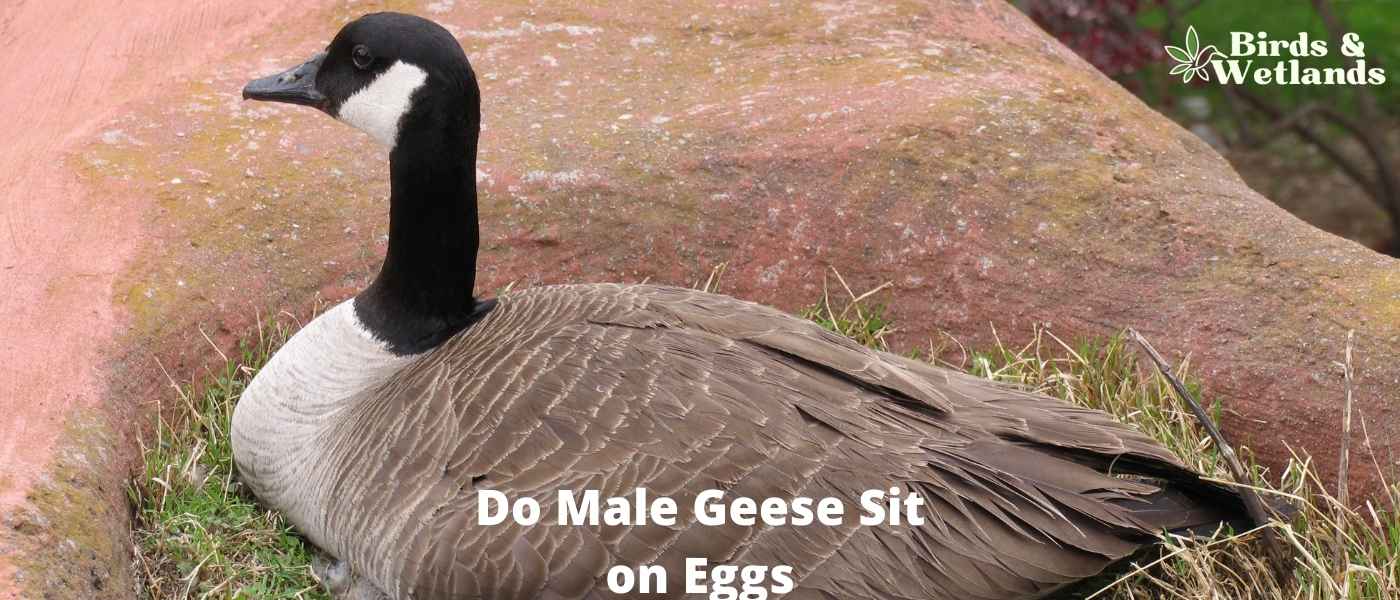Male geese do not actually sit on eggs. They typically stand guard near the nest and make sure that no one or animal comes close to it while their mates are laying or incubating their eggs. This is done in order to protect the eggs and ensure that they hatch successfully.
Key Takeaways
What Do Male Geese Do When the Females Are Incubating Eggs?
Male geese cannot incubate eggs, leaving the responsibility to female geese. It’s worth noting that geese are among the few birds that don’t break up at the end of the breeding season.
The male goose is important in the egg production process. After mating with the female, he helps fertilize the eggs.
The female will then start laying eggs in their nest which is usually located in hidden places to protect them from predators. The male goose’s role doesn’t stop there, though.
Male geese will typically leave the nest once the female geese are done laying eggs. The male’s only responsibility is to protect his mate and their eggs in the nest during mating season.
During this time, he will honk to alert her partner and other geese that there is a potential predator in the vicinity of their nest. He will usually return to the nesting area after the mating season.
How Many Eggs Does a Goose Lay Before She Sits On Them?
A goose will lay anywhere from 5 to 12 eggs before she sits on them. She lays one egg at a time until the whole clutch is complete.
Most eggs are laid early in the morning. Don’t approach nesting geese when they start incubating their eggs.
The number of eggs a goose will lay depends on the breed and age of the goose. Some breeds of geese will lay more eggs than others. Older geese usually lay more eggs than younger ones.
At What Age Do Geese Start Mating?
Males begin mating at three years, and females start breeding at three or four years old. Geese mate for life, so once a pair is formed, they remain together until one of them dies.
The young pair of male and female work together to build a nest, burying their eggs with debris to take care of their eggs. The female incubates the eggs while the male stands guard nearby for potential predators.
Once the eggs hatch, the goslings are raised by both parents.
Male geese don’t incubate the eggs in the nest. Instead, he stands guard nearby while the female goose incubates their eggs. This allows the male to continue to hunt and provide food for the family.
The female will also take breaks from incubating to eat and drink. While she is away, the male will stand guard over the nest.
It’s an amazing dynamic between the male and female geese that ensures that the eggs are always guarded and that both parents can get some rest.
FAQs on Goose Eggs
What Month Do Canadian Geese Lay Eggs?
Canadian geese lay their eggs starting in early March and continuing through late May. They usually return to the same nesting site annually, they rarely move their eggs or nests.
If for some reason the previous nesting site is no longer available, they will nest on the nearby pond or another body of water.
This timeframe may vary slightly depending on the location, but generally speaking, these are the months when you can expect Canadian geese to be laying their eggs.
Can Muscovy Ducks Incubate Goose Eggs?
The answer is yes, a broody Muscovy duck can incubate goose eggs. Farmers and breeders often use them to hatch goose eggs.
Muscovy ducks make good surrogate parents because they are very attentive and protective of their young. They will carefully turn the eggs several times daily and keep them warm and humid.
The only downside to using a Muscovy duck for surrogate hatching is that they are not as reliable as incubators regarding temperature and humidity control. This can sometimes result in lower hatching rates.
Overall, Muscovy ducks are a good option for those who want to hatch goose eggs but don’t have access to an incubator.
Will A Goose Sit On Unfertilized Eggs?
Broody geese will still sit on the eggs until the rest of the clutch hatch, even if they know that the eggs are unfertilized. They want to ensure that the eggs are properly incubated and that all the chicks in the clutch hatch simultaneously.
The unfertilized eggs will not hatch. Even so, geese protect all the eggs and will do everything possible to ensure they all hatch successfully.

